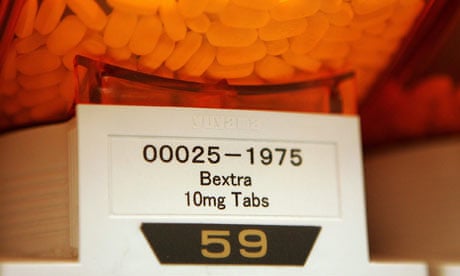Pfizer, the world's largest drugs company, has been hit with the biggest criminal fine in US history as part of a $2.3bn settlement with federal prosecutors for mispromoting medicines and for paying kickbacks to compliant doctors.
In a blow to its reputation in the eyes of doctors and patients, Pfizer pleaded guilty to misbranding the painkiller Bextra, withdrawn from the market in 2004, by promoting the drug for uses that were not approved by medical regulators.
The New York-based company also settled civil allegations concerning improper payments to doctors who prescribed nine other pharmaceutical products, although it continues to deny these charges.
Under an out-of-court deal with the US department of justice, a Pfizer subsidiary, Pharmacia & Upjohn, is paying a criminal fine of $1.3bn (nearly £800m), a record in American judicial history.
Pfizer is also paying $1bn in civil settlements to Medicare, Medicaid and other government health insurance schemes to reimburse improper prescriptions.
Prosecutors said the payments reflected the "size and seriousness" of Pfizer's infringements. Tom Perrelli, the associate attorney general, said it was a victory for the public over "those who seek to earn a profit through fraud".
Perrelli said: "Every year we lose tens of billions of dollars in Medicare and Medicaid funds to fraud. Those billions represent healthcare dollars that could be spent on medicine, elder care or emergency room visits but instead are spent on medicines or devices that are simply not effective for patients to whom they are prescribed."
Among the medicines linked to the scandal are the anti-psychotic drug Geodon, as well as the antibiotic Zyvox, and a treatment for epilepsy, known as Lyrica. The pharmaceuticals firm set aside the full cost of the settlement in its accounts in January, although the disclosure attracted little attention because it emerged on the day that Pfizer agreed to a $68bn takeover of a rival drugs firm, Wyeth.
Amy Schulman, Pfizer's general counsel, yesterday said: "We regret certain actions taken in the past, but are proud of the action we've taken to strengthen our internal controls."
Measures taken by the company include an independent review organisation to assess its promotional practices and a five-year compliance programme, monitored by federal authorities.
The fines are the culmination of a six-year investigation into Pfizer, sparked in part by a lawsuit filed by John Kopchinski, a Pfizer sales rep in Florida, who blew the whistle on what he called unethical conduct. Kopchinski, a Gulf War veteran, accused Pfizer of promoting Bextra for problems far wider than its approved uses, which were for treating arthritis and menstrual pain. He contended that this put patients at risk of heart attacks, strokes and blood clots.
"At Pfizer I was expected to increase profits at all costs, even when sales meant endangering lives. I couldn't do that," said Kopchinski, who is set to receive $51.5m under a US law rewarding whistleblowers.
Pfizer employs 90,000 people around the world including 4,000 staff in Britain, where the company has a large research and development site at Sandwich, in Kent. Its top-selling products include the anti-cholesterol drug Lipitor, the arthritis drug Celebrex and the erectile disfunction drug Viagra.
